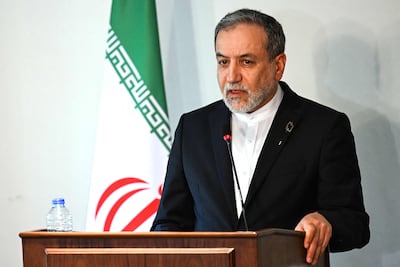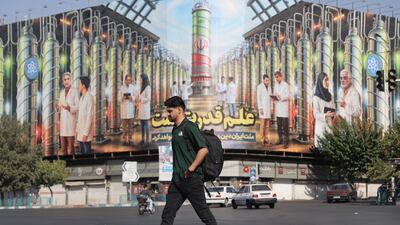Britain, France and Germany have launched a 30-day process to reimpose UN sanctions on Iran over its nuclear programme, saying Tehran has not stuck to a 2015 deal that lifted the restrictions.
Known as the “snapback mechanism”, the procedure will lead to the reinstatement of a raft of sanctions that could deal a blow to an already struggling Iranian economy.
Foreign Minister Abbas Araghchi said Iran 'will respond appropriately to this illegal and unjustified action'.
What sanctions will be reimposed?
Sanctions to be reinstated include an embargo on the export of conventional arms to Iran, along with a ban on Tehran carrying out any activity with ballistic missiles capable of delivering nuclear weapons. A ban on any transfer to Iran of ballistic missile technology will also be included.
Iran will be hit with a complete ban on uranium enrichment and reprocessing. The country has previously been permitted to enrich uranium to a low level of 3.67 per cent for a civilian nuclear programme. The question of enrichment had been at the heart of negotiations with the US in June that were brought to an abrupt end by the Israel-Iran war.
In the economic sphere, the sanctions will include a freeze on selected Iranian assets around the world and a travel ban on Iranian individuals and entities. Countries would be authorised by the UN to inspect shipments carried by Iran Air Cargo − the cargo branch of flag carrier Iran Air − and the Islamic Republic of Iran Shipping Lines.
Why are the Europeans triggering the snapback?
Under the Joint Comprehensive Plan of Action reached between world powers and Iran in 2015, Iran agreed to limit uranium enrichment to levels necessary only for civilian nuclear power, in exchange for economic sanctions being lifted. The UN's International Atomic Energy Agency was tasked with monitoring Tehran’s nuclear programme.
The snapback mechanism’s purpose is to swiftly reimpose all pre-deal sanctions without being vetoed by UN Security Council members, including permanent members Russia and China, in the event that Iran is non-compliant.
The process began on Thursday, when Britain, France and Germany − known as the E3 − formally notified the UN Secretary General Antonio Guterres and the Security Council president that they were triggering the procedure.
That begins a 30-day window during which a new resolution to continue sanctions relief for Iran must be adopted to avoid the reimposition of the restrictions. That is unlikely, as the US, Britain and France would veto such a resolution.
The US itself cannot activate the snapback since US President Donald Trump withdrew Washington from the nuclear deal in 2018.
The E3 said Iran had not adhered to the 2015 deal. They said Iran must resume negotiations with the US over its nuclear programme, allow in UN nuclear inspectors, and account for the more than 400kg of highly enriched uranium that the IAEA says it possesses.
They allege that Iran has “wilfully and publicly departed” from the nuclear deal’s commitments.
A number of countries suspect Iran is pursuing nuclear weapons, a charge that Tehran denies. In May, the IAEA said Iran had amassed 408kg of uranium enriched up to 60 per cent purity. If it is enriched to 90 per cent, it would be enough to make nine nuclear weapons, according to the UN agency, though a weapon would require other expertise, such as a detonation device.
The amount of enriched uranium far exceed the limits set out in the nuclear deal. In addition, in 2022, Tehran removed most monitoring equipment, including IAEA cameras, from its nuclear sites. A year later, Iran barred some of the watchdog's most experienced inspectors.
The view from Iran
Iran has long maintained that its nuclear programme serves peaceful purposes only. Tehran also argues that it has the right to abandon the nuclear deal’s limits because Washington withdrew from the agreement and reimposed its own sanctions.
Tehran contends there is no legal basis for the Europeans to reimpose UN sanctions, claiming the countries failed to uphold the accord after the US exit.
Specs
Engine: Electric motor generating 54.2kWh (Cooper SE and Aceman SE), 64.6kW (Countryman All4 SE)
Power: 218hp (Cooper and Aceman), 313hp (Countryman)
Torque: 330Nm (Cooper and Aceman), 494Nm (Countryman)
On sale: Now
Price: From Dh158,000 (Cooper), Dh168,000 (Aceman), Dh190,000 (Countryman)
Elvis
%3Cp%3E%3Cstrong%3EDirector%3A%3C%2Fstrong%3E%20Baz%20Luhrmann%3C%2Fp%3E%0A%3Cp%3E%3Cstrong%3EStars%3A%3C%2Fstrong%3E%20Austin%20Butler%2C%20Tom%20Hanks%2C%20Olivia%20DeJonge%3C%2Fp%3E%0A%3Cp%3E%3Cstrong%3ERating%3A%3C%2Fstrong%3E%204%2F5%3C%2Fp%3E%0A
The Sand Castle
Director: Matty Brown
Stars: Nadine Labaki, Ziad Bakri, Zain Al Rafeea, Riman Al Rafeea
Rating: 2.5/5
Where to Find Me by Alba Arikha
Alma Books
What it means to be a conservationist
Who is Enric Sala?
Enric Sala is an expert on marine conservation and is currently the National Geographic Society's Explorer-in-Residence. His love of the sea started with his childhood in Spain, inspired by the example of the legendary diver Jacques Cousteau. He has been a university professor of Oceanography in the US, as well as working at the Spanish National Council for Scientific Research and is a member of the World Economic Forum’s Global Future Council on Biodiversity and the Bio-Economy. He has dedicated his life to protecting life in the oceans. Enric describes himself as a flexitarian who only eats meat occasionally.
What is biodiversity?
According to the United Nations Environment Programme, all life on earth – including in its forests and oceans – forms a “rich tapestry of interconnecting and interdependent forces”. Biodiversity on earth today is the product of four billion years of evolution and consists of many millions of distinct biological species. The term ‘biodiversity’ is relatively new, popularised since the 1980s and coinciding with an understanding of the growing threats to the natural world including habitat loss, pollution and climate change. The loss of biodiversity itself is dangerous because it contributes to clean, consistent water flows, food security, protection from floods and storms and a stable climate. The natural world can be an ally in combating global climate change but to do so it must be protected. Nations are working to achieve this, including setting targets to be reached by 2020 for the protection of the natural state of 17 per cent of the land and 10 per cent of the oceans. However, these are well short of what is needed, according to experts, with half the land needed to be in a natural state to help avert disaster.
Honeymoonish
%3Cp%3E%3Cstrong%3EDirector%3A%3C%2Fstrong%3E%20Elie%20El%20Samaan%3C%2Fp%3E%0A%3Cp%3E%3Cstrong%3EStarring%3A%20%3C%2Fstrong%3ENour%20Al%20Ghandour%2C%20Mahmoud%20Boushahri%3C%2Fp%3E%0A%3Cp%3E%3Cstrong%3ERating%3A%3C%2Fstrong%3E%203%2F5%3C%2Fp%3E%0A
Ultra processed foods
- Carbonated drinks, sweet or savoury packaged snacks, confectionery, mass-produced packaged breads and buns
- margarines and spreads; cookies, biscuits, pastries, cakes, and cake mixes, breakfast cereals, cereal and energy bars;
- energy drinks, milk drinks, fruit yoghurts and fruit drinks, cocoa drinks, meat and chicken extracts and instant sauces
- infant formulas and follow-on milks, health and slimming products such as powdered or fortified meal and dish substitutes,
- many ready-to-heat products including pre-prepared pies and pasta and pizza dishes, poultry and fish nuggets and sticks, sausages, burgers, hot dogs, and other reconstituted meat products, powdered and packaged instant soups, noodles and desserts.
How to register as a donor
1) Organ donors can register on the Hayat app, run by the Ministry of Health and Prevention
2) There are about 11,000 patients in the country in need of organ transplants
3) People must be over 21. Emiratis and residents can register.
4) The campaign uses the hashtag #donate_hope
Miss Granny
Director: Joyce Bernal
Starring: Sarah Geronimo, James Reid, Xian Lim, Nova Villa
3/5
(Tagalog with Eng/Ar subtitles)
MATCH INFO
Real Madrid 2 (Benzema 13', Kroos 28')
Barcelona 1 (Mingueza 60')
Red card: Casemiro (Real Madrid)


